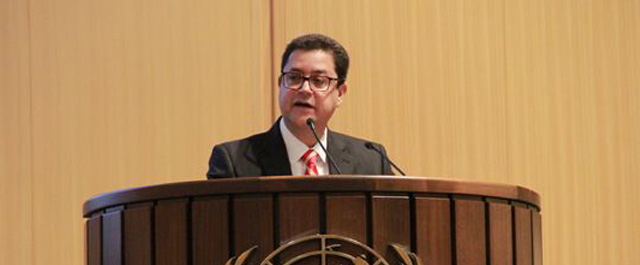Welcome remarks by VP Dr. Aly Abou-Sabaa, on behalf of Dr. Donald Kaberuka

Excellences, Festus Mogae, Former President of Botswana
Mary Robinson, Former Prime Minister of Ireland
Honorable Alemayu Tegenu, Minister of Water Irrigation and Energy of Federal Democratic Republic of Ethiopia
HE Mrs. Rhoda Peace Tumusiime, AU Commissioner for Rural Economy and Agriculture
HE Dr. Carlos Lopes, United Nations Under-Secretary-General and UNECA Executive Secretary,
Honorable Ministers of Zimbabwe and Gambia
Distinguished Delegates,
Ladies and Gentlemen,
I am honored to be here with you at the Third “Climate Change and Development in Africa” conference. Allow me to join my esteemed colleagues in expressing our appreciation to the Government of the Federal Democratic Republic of Ethiopia for hosting this important event. On behalf of President Kaberuka, I would like also to extend a special thanks to all the participants for being here today to exchange views on how to address the challenges of building the resilience of our nations and communities to climate change threats.
This conference comes at an opportune time since it provides us with a common forum for discussions, ahead of the United Nations Conference on Climate Change (COP 19) to be held in Poland, next month.
Challenges
Excellencies, Distinguished Ladies and Gentlemen
My President, Dr. Kaberuka, has often said, “we have two challenges: fighting global poverty and fighting climate change. Our failure on one means failure on the other as well”.
Climate change seriously threatens to undermine all the development and progress made so far including poverty reduction and the achievement of the Millennium Development Goals (MDGs). Climate change and rainfall variability are affecting agriculture and natural resource productivity, thereby exacerbating poverty and contributing to decline in economic growth.
Therefore, as Africa embarks on its transformation agenda, a key concern is the quality of development that the continent is undertaking. Should Africa develop at the expense of its future generations, when we are already facing more frequent occurrences of climate events such as floods, droughts, and heat waves?
Technologically, Africa has the opportunity to leapfrog rather than re-invent. This is the time for change to more greener and efficient technologies in order to win the fight against both poverty and climate change.
Africa has registered impressive growth over the past decade leading to increase in energy demand and linked emissions. This is happening at a time where most of the African population lacks access to electricity.
Africa has to continue to grow its energy sector to meet the needs of its growing population and its growth. Simultaneously, Africa will need to contribute to the global agenda of greenhouse gas reduction. Similarly, African cities, which are hosting the growing populations, are faced with numerous challenges of providing adequate and sustainable urban services like water, housing, waste management, transport, food, etc. to the continuously expanding population. As these challenges mount, the continent, should also take it as an opportunity to use proven cost-efficient and effective technologies in addressing them.
Changing the development trajectory means changing public policy; changing the way the State runs its affairs and requires Governments to be more open, inclusive and accountable. Thus, there is an urgent need to build robust state institutions, capable of developing robust policies and delivering sustainable solutions.
Transition to Green Economy
Excellences, Distinguished Ladies and Gentlemen,
As you may all be aware, the African Development Bank is committed to supporting its client countries gradually transition to green growth, as indicated in our Strategy for 2013-2022, within the context of its twin objectives of inclusive growth and transition to green growth.
The African Development Bank recognizes that there is no single approach to Green Growth that is universally applicable to all countries. It is not a one-size-fits-all magic development paradigm. It is about finding tailored-solutions that help to identify pathways that respond to the specificities and developmental needs of each African country.
African Countries themselves recognize and are already taking steps in development their economies while being mindful of the impacts of climate change and the need for longer term sustainable solutions for transforming their economies. Our hosting country, Ethiopia, is a leading example in this regard.
To share with you some examples, the African Development Bank has provided its support to Sierra Leone to mainstream green growth in its Poverty Reduction Strategy. In Mozambique, while working with UNEP and WWF, we have assisted in the elaboration of the country’s green growth action plan. Similar effort is taking place in Kenya, Rwanda and Cape Verde.
For their credit, African Countries recognize the need to move from emergency response to the impacts of climate change to identifying and implementing long term solutions to the problem. Our programs in the Horn of Africa and in the Sahel are live examples of this effort. However, this comes with cost! Building Resilience in the affected Zones will cost billions of dollars and will take time.
To close, this conference will provide us with additional opportunities to think together on how we can scale up our collective effort, build partnership for sustainable solutions, and more importantly take action.
Through our collaborative program on ClimDev with the AU and ECA, we know we will be able to make a difference!
I call on you to join us in this effort.
Thank you for your attention.
- Log in to post comments


